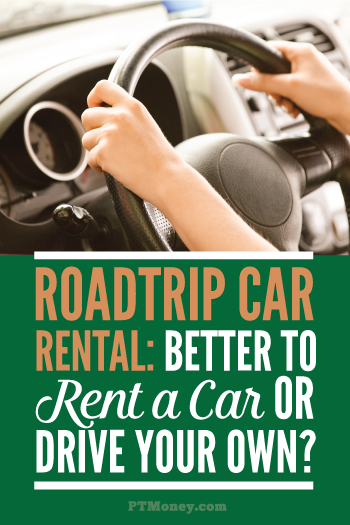Road Trip Car Rental: Is it Better to Rent a Car or Drive Your Own?
My friend David asked me about his recent car rental experience and whether I thought it helped him save money on his cross-country trip vs using his own ride.
Here are his comments:
“I actually did rent a vehicle. Whether my reasons for renting from Hertz vs. driving my own vehicle resulted in a wise spending decision or not, I couldn’t tell you. Maybe you, or one of your readers, can make a determination for me. Here are the details of my “excursion” (such a kidder, I know):
- My alternative to renting was driving my ’00 Ford Excursion half way across the US. Although still dependable with only 75k miles on the V10 gas engine, it’s still 9 years old. The last thing I needed to be dealing with on my vacation was a blown transmission, a broken a/c system, or something else that would take time away from our week at the beach. So, I’d call that the “cost of peace of mind,” (probably worth something).
- I rented a 2009 Toyota Sienna with 10k miles on it. I payed $556 for an 11 day rental period.
- Overall miles; I put 2,571 miles on the rental car; there is one oil change that I saved on 🙂
- I don’t know what the average cost per mile to drive my own vehicle before gas (cost, depreciation, routine maintenance, repairs, etc.), but let’s say it’s $0.20/mile. That would mean it would have cost me $514 before I put any gas in it ($0.20/mi. x 2,571miles = $514). Not an exact science, but I bet I’m not too far off.
- In my case, I think I saved some fuel costs too; the Ford Excursion has never won any awards for fuel economy 🙂
Not sure if any of that is useful, but you are welcome to use any of it on your blog.”

So what do you think? Did David save money? Is there ever a simple, cost-savings justification for renting vs driving your own car?
I asked some friends on Twitter and here were their thoughts:

The “Should I Rent?” Equation
Let’s look at the main elements to what I’ll call the “should I rent?” equation. The way I see it, it comes down to:
price of the rental [VS] (difference in MPG + wear and tear)
Price of the Rental
David listed his price above as $556 for an 11 day rental period. Not bad. Although I see that car rental prices have actually gone up. All you darn stay-cation-ers.
Difference in MPG
David’s Excursion gets approximately 13/15 mpg (14 avg). The Sienna he rented gets approximately 17/23 mpg (19 avg). Therefore, on his trip of 2,571 miles, his gallons used were 135.3. Had he taken his own ride, it would have been 183.6. At $2.50 per gallon. He spent $338.25 vs $459.00 for a savings of $120.75.
Wear and Tear Costs
Okay, now the factor that’s most difficult to calculate. What kind of wear and tear would David’s Excursion receive had he taken it? You can’t really use the IRS business mileage deduction, normally around .50 cents per mile because that includes gas (already factored in) and insurance (a sunk cost for David).
So that leaves things like car tires, oil changes, and other maintenance, as well as general depreciation. I’d say David is pretty close with his .20 cents a mile estimate. But let’s back into that number:
- Oil Changes – I’ll give David the $25 for the one oil change.
- Tires – I priced it out at Discount Tire, and a new set of 40k tires for the Excursion would cost around $500. That’s a per mile cost of 0.0125. Therefore, David’s trip cost him $33 in tires.
- Depreciation – To calculate this I went really conservative and went to Edmunds.com and did a True Market Value search. I compared a ’00 Excursion with 75,000 miles (current mileage) vs one with 77,500 miles (mileage had he taken it) to see how the mileage would affect the resale value. The difference in resale of the two vehicles was $44. Not as much as I would have thought.
- Repairs – I thought it was only fair to throw in some estimated repair costs from those miles. The best way I knew to estimate this was to get a quote for an extended warranty to cover repairs. The quote I requested was for this specific vehicle and covered 3 years or 50,000 (I figure the Excursion will be just about done at that point). The quote totaled $1,300, or .026 per mile. Using that rate, this trip would have cost David $67 in future repair costs.
That brings the total wear and tear cost to $169. That’s closer to a .07 cent per mile cost vs David’s .20 cent estimate.
Using our formula above here’s how the total numbers look:
$556 [VS] $289.75 (120.75 + 169)
Based on that formula, it looks like David, by renting, spent $266.25 more than it would have ultimately cost him by taking his Excursion. What do you think? Was I too conservative on my costs? Did I leave anything out?
Non-Monetary Factors
It would be remiss of me not to discuss some of the non-monetary factors involved here. As David mentioned, he had a “piece of mind” taking a new car across country vs chancing it with his ’00. I agree that is worth something. Other non-monetary reasons to rent:
A Better Fit – Certain rental cars may be a better fit for the type of trip your taking. For instance, you would need to downsize to a smaller vehicle if you’re going to be maneuvering in and around a tight city.
Extended Test Drive – It might be a good idea to use a rental as an extended test drive. There’s a definite value in being able to check out a particular model over a week vs a 10 minute drive.
The Cool Factor – It’s just fun to rent a new car. It adds to the experience of the trip. And new cars often come with the bells and whistles we aren’t experiencing with our used cars.
Tips for Saving On Your Rental
Finally, here are a few tips to keep handy next time you decide to rent vs buy.
Shop Around – Visit all the big sites like Expedia and Orbitz. But also go direct to the rental car websites. And don’t be afraid of the smaller rental car companies.
Rent on Tuesday or Wednesday – This is the best time of the week to rent a car. Business travelers are usually on the road Sunday night or Monday morning, while rentals for vacation peak Thursday through Saturday. So take advantage of the slow time and rent your car midweek.
Apply Discounts – Take advantage of any memberships you might have, look for deals through your insurance company, apply airline miles, and even ask your hotel concierge.
Stay Away from Airports – I didn’t realize this, but apparently car rental shops near the airport are more expensive.
So what are your thoughts? Would you ever consider renting a car to try and save money on your trip?






I’m glad I saw these numbers. I was debating whether or not to rent a car for a trip from GA to MD and saw these numbers. Normally, that would mean driving my car would be cheaper (I have a 28MPG car) HOWEVER, Hertz is doing a weekend special of 15.99/a day. Which is 70% than what David spent. Meaning my wear and tear at .07/a mile for 1500 = 105 dollars.
Where as my total rental cost will be 75.05. The clear winner in this equation.
70% less*
Granted my Toyo Tires probably cost less for a full set. But that would still bring the cost to be near/equal to the cost of rental..so add in the perks of renting it still wins.
Math is fun.
Excuse me, MY math is wrong. And reading comprehension!
The math is totally correct. I retact my previous post made in haste.
Am I dumb or is the math incorrect on this post? Someone prove me worong, please!
David spent $556 total on the Sienna rental (sounds like gas is included in this total).
According to your math, at $2.50 per gallon for his 2,571 mile trip, gas alone for the Excursion would equal $469. That amount plus the cost of wear and tear that you calculated at $169 would total $628.
The savings of $120.75 would not be a factor in the overall math because he would not be saving any gas driving the Excursion – he would still spend $469 on gas for the Ford.
628 [469+169] – 556 = 72
Therefore, he would have spent $72 MORE driving the Excursion versus the Sienna.
So I actually did the opposite and bought a car once instead of renting. 🙂
I know, it sounds weird, but I had just relocated from overseas to the US and my car was still being shipped (I was in the military). It was going to be at least two weeks before my vehicle would arrive. I was only 23 years old, which made renting a car both more difficult and more expensive, so instead of going through the hassle, or bumming rides for two weeks, I bought a car for $1,995 from the used car lot a mile from base. I drove it all summer until I sold it about 5 months later for $1,951. The only thing I put into it was gas and insurance money, so I would say I came out ahead. Not a common situation, but it worked for me!
For me, the peace of mind would be worth the difference in price. If your own car has some major, unforeseen trouble on vacation, not only are you stuck with having to make expensive, difficult decisions on vacation, but your life after the vacation could be negatively impacted as well (no car to go to work).
Also, $50/day seems high. Everybody knows you can get cheaper rentals through Priceline, right?
Car rental is became a good source to earn money through vehicle, as in many countries people use to rent a car for the tourist. Interesting article to read more about teens and car rentals. There are many people who tries to rent their cars on good amount, my uncle has rented our Mahindra Bolero in California.
http://newcars.indiandrives.com/
Car rental is became a good source to earn money through vehicle, as in many countries people use to rent a car for the tourist. Interesting article to read more about teens and car rentals. There are many people who tries to rent their cars on good amount, my uncle has rented our Mahindra Bolero in California.
http://newcars.indiandrives.com/
I think you did a very unbiased job at evaluating the cost aspect. However I think this all comes down to how much you value peice of mind. Most important question that was not answered? Is a happy joyful vacation with your family worth spending an extra $250 to increase the likely hood of no car foul ups by say even at least 2%. I say yes others may not agree. Depending on your financial situation you may have no choice but to take the risk to even go on vacation but if you have it pay it. Nothing worse then sitting on the side of the road missing vacation days to save $250 of which you are going to give even more now to get it repaired and depending on the time it takes to repair your whole vacation may be shot once they get the parts in. If you always plan for the worst you decrease the likely hood of being disappointed. If your going on a short trip to grandmas for the weekend say a 2-4 hour trip drive your own car if it acts up you can always see grandma next week.
We should go to car rental websites to rent a car. I think it’s a good idea..
Do any of you guys work on cars? Ever replace parts? Know anything about them? I don’t mean this sarcastically or angrily, I’m genuinely curious.
With proper maintenance, a 2000 year car with less than 100,000k is barely considered broken in. When the car reaches 100,000k miles, you will know the nuances of it and will have all the kinks worked out. New cars are rarely recommended for long trips because they haven’t been driven long enough for faulty parts or poor mechanical work to show yet.
I took a 97′ XJ Jeep Cherokee on a 5,000 mile trip when it has 205,000 miles on it. This was because I was the second owner, and I’d taken care of it. Regular oil changes, transmission fluid changes. Before leaving on the big trip, I made these repairs:
– New radiator
– New water pump/hoses
– New timing belt
– New oxygen sensor
– New front brakes
– Brake/Transmission/Engine fluid changes
Total Cost: $400 (I did the labor myself, a 21y-o female with no prior experience. If I could learn, others can too)
These things put the Jeep back in prime condition. It didn’t have a single hiccup during the trip. It now has nearly 300,000 miles on it and only has had its regular oil changes and filter changes. The body is still in very good condition (only micro-rust where pebbles flecked the paint), the engine and tranny are strong.
Sometimes I wonder if people are overly cautious because they don’t really know much about a cars actual mechanics and parts. I also wonder if people just upgrade to new cars because they get tired of using the same car and use miles as an excuse. I mean, I see people updating cars at 50k miles like that is a lot or something.
My husband and I have been discussing this very thing only with a different twist. Is it more economical to drive junkers around home (say $4000 to $5000 cars you can pay cash for ) and then rent a car for trips? We tend to drive cars/vans until they are on their last legs but not trustworthy to take out of state. We did, however, drive our 1988 Caravan from Ohio to FL once with 200,000 miles on it.
THANK YOU!! This actually helped a lot. These were the exact questions I have been asking. I am making a long road trip from L.A. to Phoenix to Tulsa and back again. I will be away from home for 2 months. I was worried that the wear and tear on the car would be too much as I have already taken it on long road trips. However, it’s the best little car and I get amazing gas mileage!! I take very good care of it with regular maintenance. Thank you for taking the time to break it down for us and for adding those links!! And if anyone wants a great vehicle check out the Toyota Echo. Seriously amazing gas mileage. On the highway 38mpg easy. It’s little and fits everywhere but is still roomy with a surprisingly roomy trunk for a small car. I am going to use your links to find out just how much wear and tear I will actually cause it. Thank you again!! Well written article.
Great article. I think renting is a great way to travel on vacation especially if you need a bigger vehicle than you need on a daily basis. I drive a Toyota Corolla daily that gets 33+ MPG but it’s not necessarily our first choice for a family of 4 plus our golden retriever for a long road trip. The initial buy-in, maintenance, and fuel to own and run a large vehicle daily far outweighs the rental costs when it comes to renting a larger vehicle. This very conclusion is what led me to start my own rental company but I have added the benefit of ‘going green’. I currently have a Ford F-250 truck running on BioDiesel. It’s a four door so we can fit the two car seats and the dog inside while all the luggage stays dry in the bed with a cover. I had a customer take it to New York and back earlier this spring to bring his son back from college and was very pleased. I’m in the North Dallas area if anyone needs to haul a load of lumber or take a long family road trip.
This is a great article. As I was reading the original comments from your friend David, I was mainly struck by the line about 20 cents/mile for depreciation, as that seems to be the main contention that the rental car scenario could be cheaper. My immediate reaction was “No, that’s not right” because that’s not the correct comparison to make regarding incremental costs or savings.
His personal vehicle is still going to depreciate whether or he takes it on the trip or not. It is true that it will depreciate faster if he runs off an additional 2,500 miles, but it’s still going to depreciate even if it sits in the garage the whole year. In fact, I’d bet the “time factor” part of the depreciation equation is much bigger than the “miles factor” part of auto depreciation. However, I was perplexed at how to measure that.
I was glad to see you came to the same conclusion and took that line of thinking much further than I did. The Edmunds hack is very clever and I believe it’s actually a pretty sound approach to making a fair comparison.
Sure, you are accounting for a theorectical deprecieation amount and I applaud you for that.
However, i can tell you from first hand experience that my 2001 Hyundai Santa Fe will depreciate far more than what Edmuinds will reflect simply because once you have large repair items, the car rapidly decreases in value on the open market. It is far more valuable to me than to anyone looking to buy it, simply because at some point, the cost of repairs will outstrip the value, forcing me to find an alternative vehicle – which becomes more costly. If my car my car only depreciates by $50 with 1000 more miles put on it according to Edmunds [and that is if I could actually get that amount for an suv in this market], but my engine blows or my ac compressor gives out and it is a 2500 repair, i am screwed. This is the opportunity cost that you haven’t figured. If I drive my car and it breaks down, my true cost for those miles is exhorbitant. With newer cars, not a big deal, with older unreliable brands, renting a car may be cheaper.
Again, I give you credit for your analysis, i just wish there were resources online to help you determine what the actual costs for the actual car you have are.
@Jason – I disagree that basic is bad. The difference in edmunds.com true market value is as close as you’re going to get to true cost of wear and tear. I think it’s pretty genius that I thought of that actually. I’m typically not that smart. 😉
Good article, however I would love to see a more scientific approach to help you determine the true cost of driving your car – specifically one that allows you to input the brand, age, existing miles, distance driving, and current condition of existing vehicle.
I think your attempt to determine the cost was good, but very basic and leaves out a lot of factors that actually impact your decision greatly…
I own a brand new Accord and an 8 yr old Santa Fe. We want to go from Phx to San Diego next month and I am trying to determine if renting is the way to go. My accord won’t hold my kid and all our stuff for her and for the beach – otherwise i would drive that more than likely [due to the fact it gets 27 mpg already and that it is under warranty]. The Santa Fe is questionable. I certainly believe that the wear and tear on that vehicle will be more damaging than that on my accord. Therefore, the cost would be vastly different. I found that I could rent a similar sized car for $540. The question is what my Santa Fe will cost me if I take it. I am not sure there is an answer for that…
I’ve rented for a couple of trips just before the motomobile gave up the ghost. I’ll completely admit it was for the peace of mind. When your mechanic says “sometime in the next 10,000 miles, your transmission will give out”, you do NOT want to be halfway to Memphis at that point.
I knew that I would be buying, not repairing (since that wasn’t the only issue with my old car). And I did use the opportunity for the extended test drive. I narrowed my ‘list’ of cars to consider buying and re-ordered the list based on comfort, design convience. (Little things like controls, cup holders, sound system are not deal breakers, but given two vehicles with similar mileage, value, tax and insurance stats, I’ll buy the more comfortable, better appointed one.)
Interesting post. We had neighbors who always would rent for vacation drives — even for relatively short hops like Phoenix to Las Vegas. I never asked how they justified it.
One thing we might consider is that David’s car is a nine-year-old Ford, a brand not known for its stalwart reliability. If the vehicle craps out on the road, where he doesn’t know a mechanic and is likely to get ripped off, repairs are going to cost a ton of money.
Also, the thing has 75,000 miles on it. My 2000 Toyota Sienna is supposed to get a major service at 90,000 miles, to the tune of $1,200. Presumably Fords also need periodic service (once a day, as I recall from the last one I owned…). Adding almost 2600 miles to the odometer brings the vehicle that much closer to an expensive appointment with the mechanic. Renting a car for a long-haul drive delays the day of financial reckoning. Given the Ford’s present mileage, he’s only putting about 8333 miles a year on the thing. This means he’s put off a major service for over three months. It being a Ford, it probably won’t run that much longer, and so he may have evaded a major service bill altogether. 😉
PT, glad you posted this. Carrie and I were discussing this the whole way home from church… I was just more curious than anything on the real savings if any.
Often for longer trips it will be cheaper to rent, but psychologically people have a hard time paying more to rent a car when they already have a car. It is one of those inconstancies in our thinking about money. Hopefully this post will encourage people to run the numbers.
Great article PT. Thanks for all the advice and thanks to your readers too for their thoughts. All good stuff. Consider my $266 that I overspent to be stimulus money for Hertz. I better not see them applying for any federal money now!!
Don’t forget that things like the Entertainment Book often have coupons and discounts to make renting even more appealing.
Whenever my wife & I rent, we always apply the discounts and do the cost analysis calculations. As you found in your equation it appears to be a wash at best with most cars.
So what’s the answer?
1. In my experience you MUST rent a car that gives you 30+ miles per gallon to benefit you monetarily. As I mentioned in my tweet to PT, me & the wife ALWAYS go with a Ford Focus because they are 35+ mpg highway, which is where you spend most of your time on long road trips.
2. Your road trip has to be long enough to offset the cost of the rental. The longer your trip, the more money you will save with a fuel efficient rental.
Cheers… happy renting!
As you said, stay away from airports (if it’s convenient) – and if you’re a bit more flexible you can save a ton of money by using hotwire to rent a car – we saved a couple hundred dollars over normal rental agency costs just by being flexible about which rental agency we used.
You can also save by making sure not to add “extras” like GPS, duplicate insurance coverage and pre-paid gas.
One last tip – if you’re renting through a regular agency, do a google search to find corporate discount codes to get a discount on your rental.
It really depends on all the factors you list above. When we drove to Virginia we took our recently bought mini-van. It would have felt like a waste for us to rent a car when ours was brand new.
But I can see the point in renting. If our van were older we may have considered a rental.
If you look around you can find all sorts of deals on car rentals. You can usually sign up for “executive” clubs with many of the rental companies and get promos and better service at locations.
Good point about avoiding the airports. They are usually more expensive because usually they are the only one’s that allow one-way rentals.